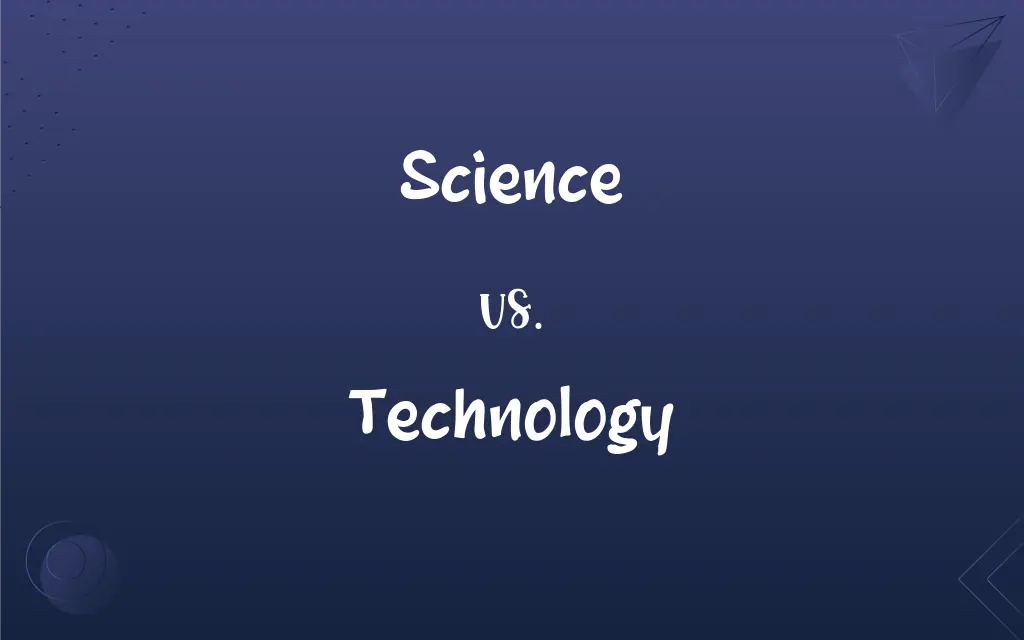Science vs. Technology: What's the Difference?
Edited by Janet White || By Harlon Moss || Updated on October 19, 2023
Science is the systematic study of the natural world, while technology is the application of scientific knowledge for practical purposes.

Key Differences
Science and technology are intertwined fields that significantly influence modern society. While both revolve around understanding and utilizing the world around us, they differ in their primary objectives and methods. Science seeks to understand the principles and laws of the universe, delving deep into phenomena to grasp their essence. On the other hand, technology uses the knowledge derived from science to create tools, processes, and systems that solve real-world problems.
The foundations of science lie in observations, experiments, and the formulation of theories. Scientists, through systematic inquiry, aim to uncover the truth about the world, be it the smallest particle or the vastness of the universe. Technology, in contrast, is rooted in innovation and design, with technologists and engineers focusing on crafting solutions to everyday challenges, be it building a bridge or developing a new software program.
A critical distinction between science and technology lies in their goals. While science is primarily driven by curiosity and the desire to expand human knowledge, technology is driven by the need to address specific societal needs and improve human life. The discoveries in science might not always have immediate applications, whereas technology's advancements are usually meant for immediate use.
Another way to understand the difference between science and technology is to consider their outcomes. Scientific discoveries often result in a deeper understanding, new theories, or insights. In contrast, technological innovations lead to new products, methods, or systems. For instance, while science might uncover the properties of a new material, technology would find ways to use that material effectively.
It's important to realize that science and technology, though distinct, are mutually dependent. Scientific discoveries often pave the way for technological advancements, and conversely, technology can aid scientific research by providing advanced tools and methodologies.
ADVERTISEMENT
Comparison Chart
Definition
The systematic study of the natural world.
The application of scientific knowledge for practical purposes.
Objective
Understand the principles and laws of the universe.
Solve real-world problems using scientific knowledge.
Driven by
Curiosity and the desire to expand knowledge.
Need to address specific societal needs and improve life.
Result
Deeper understanding, new theories, or insights.
New products, methods, or systems.
Methodology
Observations, experiments, and formulation of theories.
Innovation, design, and creation of tools or processes.
ADVERTISEMENT
Science and Technology Definitions
Science
The systematic study of the universe's structure and behavior.
Through science, we discovered the laws of physics that govern our world.
Technology
The know-how that enables humans to change or create environments.
With the help of technology, we can now harness solar energy for various purposes.
Science
An organized body of knowledge on a particular subject.
Biology is the science of living organisms.
Technology
Tools, machines, techniques, and processes used to achieve goals.
Modern transportation technology has drastically reduced travel time across continents.
Science
The pursuit of knowledge about the physical and natural world.
Thanks to science, we now understand how diseases spread and can combat them.
Technology
A product of engineering using known scientific principles.
Digital technology has transformed the way we communicate and access information.
Science
The methodical investigation of phenomena to establish facts and principles.
Through rigorous science, we have established the foundational principles of chemistry.
Technology
The application of scientific knowledge for practical purposes.
The invention of the smartphone is a testament to the advancements in technology.
Science
A discipline that seeks to understand the natural world through observation and experimentation.
Science has been instrumental in understanding the mechanics behind weather patterns.
Technology
The collective techniques and apparatus used in the production of goods and services.
The manufacturing industry has been revolutionized by automation technology.
Science
The observation, identification, description, experimental investigation, and theoretical explanation of phenomena
New advances in science and technology.
Technology
The application of science, especially to industrial or commercial objectives.
FAQs
What is science's primary goal?
To understand the natural world through systematic study and research.
Can science exist without technology?
While science can exist without modern technology, technological tools often aid and enhance scientific research.
How does technology benefit society?
Technology provides solutions to everyday challenges, improves quality of life, and drives economic growth.
Is computer coding considered technology?
Yes, computer coding is a part of information technology used to create software and applications.
Why is science considered a systematic discipline?
Because it follows a methodical approach, relying on observation, experimentation, and evidence.
Who are famous contributors to science?
Figures like Albert Einstein, Marie Curie, and Isaac Newton have made significant contributions to science.
How does science drive technology?
Scientific discoveries often lead to new technological innovations by providing foundational knowledge.
What's an example of science impacting daily life?
The understanding of germs and disease has led to hygiene practices that keep us healthy.
Can technology be harmful?
While technology offers many benefits, it can also pose risks or unintended consequences if misused or not understood.
Can all technology be traced back to a scientific principle?
Most technologies are based on scientific principles, but some also incorporate artistic or design elements.
Why is technology continuously evolving?
Technology evolves to meet changing societal needs, leverage new discoveries, and improve upon existing systems.
How does science benefit from technology?
Technology provides tools and methods that enhance scientific research and data analysis.
Why are science and technology critical for modern societies?
They drive progress, improve quality of life, solve challenges, and are key for informed decision-making.
What role does mathematics play in science?
Mathematics provides the language and tools to describe and understand scientific phenomena.
What's a recent technological advancement influenced by science?
CRISPR technology for gene editing is based on biological mechanisms discovered through scientific research.
Are there ethical considerations in both science and technology?
Yes, both fields must consider the ethical implications of their work and its impact on society.
How are science and technology taught in schools?
They are often taught both as separate subjects and in an integrated manner, especially in STEM education.
Are smartphones a product of science or technology?
Smartphones are a product of technology, but they rely on scientific principles in their operation.
How has technology impacted communication?
Technology, like the internet and smartphones, has made communication instantaneous and global.
Can technology exist without science?
Some rudimentary technologies might, but advanced technology largely depends on scientific understanding.
About Author
Written by
Harlon MossHarlon is a seasoned quality moderator and accomplished content writer for Difference Wiki. An alumnus of the prestigious University of California, he earned his degree in Computer Science. Leveraging his academic background, Harlon brings a meticulous and informed perspective to his work, ensuring content accuracy and excellence.
Edited by
Janet WhiteJanet White has been an esteemed writer and blogger for Difference Wiki. Holding a Master's degree in Science and Medical Journalism from the prestigious Boston University, she has consistently demonstrated her expertise and passion for her field. When she's not immersed in her work, Janet relishes her time exercising, delving into a good book, and cherishing moments with friends and family.































































